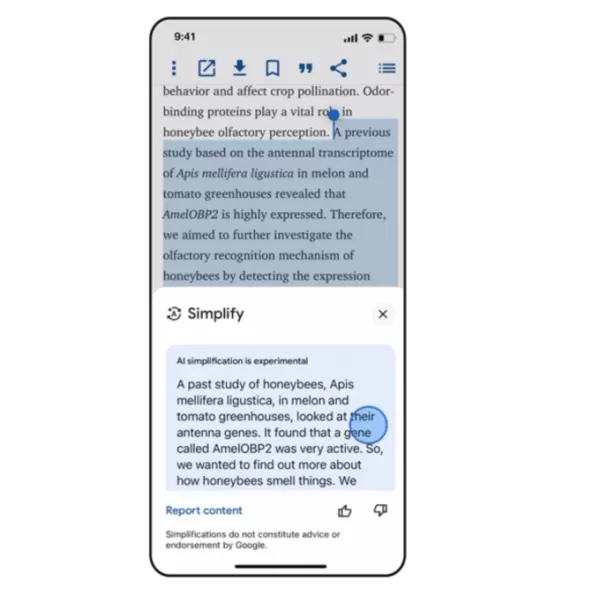Google Unveils Production-Ready Gemini 2.5 AI Models to Rival OpenAI in Enterprise Market

Google intensified its AI strategy Monday, launching its advanced Gemini 2.5 models for enterprise use and introducing a cost-efficient variant to compete on price and performance.
The Alphabet-owned company elevated its flagship AI models—Gemini 2.5 Pro and Gemini 2.5 Flash—from testing to full availability, demonstrating readiness for critical business applications. Alongside, Google debuted Gemini 2.5 Flash-Lite, marketed as the most budget-friendly option for high-volume tasks.
These moves mark Google’s boldest effort to challenge OpenAI’s dominance, delivering a versatile AI toolkit for enterprises, from premium problem-solving to cost-effective automation. The timing aligns with growing corporate demand for scalable, reliable AI solutions.
Why Google Transitioned Its Top AI Models to Production
Google’s shift to production status responds to OpenAI’s swift rollout of consumer and enterprise AI tools. While OpenAI has grabbed attention with ChatGPT and GPT-4, Google adopted a meticulous testing phase to ensure its models meet enterprise standards.
“The Gemini 2.5 era is gaining traction,” wrote Jason Gelman, Vertex AI Product Management Director, in a blog post. The statement underscores Google’s intent to solidify its AI platform’s reputation among business clients.
The launch capitalizes on recent OpenAI setbacks regarding model safety, positioning Google as a dependable, enterprise-oriented alternative.
How Gemini’s Reasoning Powers Enhance Enterprise AI Control
Google’s focus on “reasoning” capabilities sets its models apart, enabling deliberate problem-solving over instant responses. Unlike typical language models, Gemini 2.5 can allocate extra processing time to tackle intricate tasks methodically.
This “reasoning budget” empowers developers to fine-tune AI performance, balancing speed and precision for specific business needs. The feature meets a key enterprise demand: consistent, customizable AI behavior.
Gemini 2.5 Pro, the most advanced model, shines in complex problem-solving, code creation, and multimodal analysis, handling up to one million tokens—about 750,000 words—for tasks like codebase reviews or document analysis.
Gemini 2.5 Flash prioritizes efficiency for high-volume tasks like document summarization or chat applications. The new Flash-Lite variant trades some sophistication for significant cost reductions, ideal for translation or classification tasks.
Leading Firms Adopt Gemini 2.5 for Critical Operations
Major enterprises are already deploying these models, reflecting Google’s confidence in their reliability. Snap Inc. leverages Gemini 2.5 Pro for spatial intelligence in AR glasses, converting 2D images into 3D for augmented reality.
SmartBear, a software testing provider, uses Gemini 2.5 Flash to automate test script creation. “The benefits are diverse,” said Fitz Nowlan, SmartBear’s AI VP, noting faster testing and lower costs.
Connective Health, a healthcare tech firm, employs the models to extract critical data from complex medical records, highlighting their precision in high-stakes industries.
Google’s Pricing Strategy Appeals to Diverse Enterprise Needs
Google’s pricing overhaul underscores its competitive ambitions. It increased Gemini 2.5 Flash input token costs from $0.15 to $0.30 per million but lowered output token prices from $3.50 to $2.50, favoring applications with lengthy outputs.
By eliminating the complex “thinking” versus “non-thinking” pricing, Google simplified budgeting for enterprises. Flash-Lite, priced at $0.10 per million input tokens and $0.40 per million output tokens, targets cost-conscious workloads.
This pricing structure positions Google against smaller AI vendors offering low-cost models, broadening its market appeal.
Google’s Tiered Models Reshape AI Market Dynamics
Releasing three production-ready models across performance levels reflects a strategic market approach. Google mirrors traditional software tactics, offering varied options to suit different budgets while encouraging upgrades as needs grow.
Unlike OpenAI’s focus on high-end models, Google’s affordable alternatives could disrupt pricing norms, especially for high-volume use cases where cost efficiency trumps peak performance.
The million-token context capacity supports unique enterprise needs, like analyzing legal contracts or financial reports, giving Google an edge in complex document processing.
Google’s Enterprise Focus Contrasts OpenAI’s Consumer Push
As AI competition heats up, enterprise applications promise greater revenue than consumer chatbots. Google’s emphasis on production readiness signals a shift from past launches that lacked business alignment.
The extended testing of Gemini 2.5, paired with early enterprise collaborations, shows a refined development strategy. The reasoning feature counters concerns about hasty AI decisions, enhancing trust in critical applications.
What Enterprises Must Consider When Selecting AI Platforms
Google’s Gemini 2.5 rollout positions 2025 as a critical year for enterprise AI adoption. With models covering diverse needs, Google has lowered technical and financial hurdles to implementation.
Success hinges on real-world performance across industries. Early adopters report strong results, but widespread validation requires extended use.
Technical leaders face increased complexity in choosing models tailored to their needs, demanding robust evaluation strategies. The choice of AI platform will increasingly shape competitive edges as adoption grows.
Google aims to be the enterprise AI leader, a role with immense potential as businesses integrate AI. After trailing OpenAI’s buzz, Google is now actively delivering AI solutions.
Related article
 Meta Offers High Pay for AI Talent, Denies $100M Signing Bonuses
Meta is attracting AI researchers to its new superintelligence lab with substantial multimillion-dollar compensation packages. However, claims of $100 million "signing bonuses" are untrue, per a recru
Meta Offers High Pay for AI Talent, Denies $100M Signing Bonuses
Meta is attracting AI researchers to its new superintelligence lab with substantial multimillion-dollar compensation packages. However, claims of $100 million "signing bonuses" are untrue, per a recru
 Google Unveils AI-Powered Simplify Tool for Easier Web Reading
Google’s iOS app now includes a “Simplify” feature, leveraging AI to transform complex web text into clear, understandable content without leaving the page.The Simplify tool, developed by Google Resea
Google Unveils AI-Powered Simplify Tool for Easier Web Reading
Google’s iOS app now includes a “Simplify” feature, leveraging AI to transform complex web text into clear, understandable content without leaving the page.The Simplify tool, developed by Google Resea
 OpenAI Marketing Chief Takes Leave for Breast Cancer Treatment
Kate Rouch, OpenAI’s marketing leader, is taking a three-month leave to focus on treatment for invasive breast cancer.In a LinkedIn post, Rouch announced that Gary Briggs, former Meta CMO, will act as
Comments (0)
0/200
OpenAI Marketing Chief Takes Leave for Breast Cancer Treatment
Kate Rouch, OpenAI’s marketing leader, is taking a three-month leave to focus on treatment for invasive breast cancer.In a LinkedIn post, Rouch announced that Gary Briggs, former Meta CMO, will act as
Comments (0)
0/200

Google intensified its AI strategy Monday, launching its advanced Gemini 2.5 models for enterprise use and introducing a cost-efficient variant to compete on price and performance.
The Alphabet-owned company elevated its flagship AI models—Gemini 2.5 Pro and Gemini 2.5 Flash—from testing to full availability, demonstrating readiness for critical business applications. Alongside, Google debuted Gemini 2.5 Flash-Lite, marketed as the most budget-friendly option for high-volume tasks.
These moves mark Google’s boldest effort to challenge OpenAI’s dominance, delivering a versatile AI toolkit for enterprises, from premium problem-solving to cost-effective automation. The timing aligns with growing corporate demand for scalable, reliable AI solutions.
Why Google Transitioned Its Top AI Models to Production
Google’s shift to production status responds to OpenAI’s swift rollout of consumer and enterprise AI tools. While OpenAI has grabbed attention with ChatGPT and GPT-4, Google adopted a meticulous testing phase to ensure its models meet enterprise standards.
“The Gemini 2.5 era is gaining traction,” wrote Jason Gelman, Vertex AI Product Management Director, in a blog post. The statement underscores Google’s intent to solidify its AI platform’s reputation among business clients.
The launch capitalizes on recent OpenAI setbacks regarding model safety, positioning Google as a dependable, enterprise-oriented alternative.
How Gemini’s Reasoning Powers Enhance Enterprise AI Control
Google’s focus on “reasoning” capabilities sets its models apart, enabling deliberate problem-solving over instant responses. Unlike typical language models, Gemini 2.5 can allocate extra processing time to tackle intricate tasks methodically.
This “reasoning budget” empowers developers to fine-tune AI performance, balancing speed and precision for specific business needs. The feature meets a key enterprise demand: consistent, customizable AI behavior.
Gemini 2.5 Pro, the most advanced model, shines in complex problem-solving, code creation, and multimodal analysis, handling up to one million tokens—about 750,000 words—for tasks like codebase reviews or document analysis.
Gemini 2.5 Flash prioritizes efficiency for high-volume tasks like document summarization or chat applications. The new Flash-Lite variant trades some sophistication for significant cost reductions, ideal for translation or classification tasks.
Leading Firms Adopt Gemini 2.5 for Critical Operations
Major enterprises are already deploying these models, reflecting Google’s confidence in their reliability. Snap Inc. leverages Gemini 2.5 Pro for spatial intelligence in AR glasses, converting 2D images into 3D for augmented reality.
SmartBear, a software testing provider, uses Gemini 2.5 Flash to automate test script creation. “The benefits are diverse,” said Fitz Nowlan, SmartBear’s AI VP, noting faster testing and lower costs.
Connective Health, a healthcare tech firm, employs the models to extract critical data from complex medical records, highlighting their precision in high-stakes industries.
Google’s Pricing Strategy Appeals to Diverse Enterprise Needs
Google’s pricing overhaul underscores its competitive ambitions. It increased Gemini 2.5 Flash input token costs from $0.15 to $0.30 per million but lowered output token prices from $3.50 to $2.50, favoring applications with lengthy outputs.
By eliminating the complex “thinking” versus “non-thinking” pricing, Google simplified budgeting for enterprises. Flash-Lite, priced at $0.10 per million input tokens and $0.40 per million output tokens, targets cost-conscious workloads.
This pricing structure positions Google against smaller AI vendors offering low-cost models, broadening its market appeal.
Google’s Tiered Models Reshape AI Market Dynamics
Releasing three production-ready models across performance levels reflects a strategic market approach. Google mirrors traditional software tactics, offering varied options to suit different budgets while encouraging upgrades as needs grow.
Unlike OpenAI’s focus on high-end models, Google’s affordable alternatives could disrupt pricing norms, especially for high-volume use cases where cost efficiency trumps peak performance.
The million-token context capacity supports unique enterprise needs, like analyzing legal contracts or financial reports, giving Google an edge in complex document processing.
Google’s Enterprise Focus Contrasts OpenAI’s Consumer Push
As AI competition heats up, enterprise applications promise greater revenue than consumer chatbots. Google’s emphasis on production readiness signals a shift from past launches that lacked business alignment.
The extended testing of Gemini 2.5, paired with early enterprise collaborations, shows a refined development strategy. The reasoning feature counters concerns about hasty AI decisions, enhancing trust in critical applications.
What Enterprises Must Consider When Selecting AI Platforms
Google’s Gemini 2.5 rollout positions 2025 as a critical year for enterprise AI adoption. With models covering diverse needs, Google has lowered technical and financial hurdles to implementation.
Success hinges on real-world performance across industries. Early adopters report strong results, but widespread validation requires extended use.
Technical leaders face increased complexity in choosing models tailored to their needs, demanding robust evaluation strategies. The choice of AI platform will increasingly shape competitive edges as adoption grows.
Google aims to be the enterprise AI leader, a role with immense potential as businesses integrate AI. After trailing OpenAI’s buzz, Google is now actively delivering AI solutions.
 Meta Offers High Pay for AI Talent, Denies $100M Signing Bonuses
Meta is attracting AI researchers to its new superintelligence lab with substantial multimillion-dollar compensation packages. However, claims of $100 million "signing bonuses" are untrue, per a recru
Meta Offers High Pay for AI Talent, Denies $100M Signing Bonuses
Meta is attracting AI researchers to its new superintelligence lab with substantial multimillion-dollar compensation packages. However, claims of $100 million "signing bonuses" are untrue, per a recru
 Google Unveils AI-Powered Simplify Tool for Easier Web Reading
Google’s iOS app now includes a “Simplify” feature, leveraging AI to transform complex web text into clear, understandable content without leaving the page.The Simplify tool, developed by Google Resea
Google Unveils AI-Powered Simplify Tool for Easier Web Reading
Google’s iOS app now includes a “Simplify” feature, leveraging AI to transform complex web text into clear, understandable content without leaving the page.The Simplify tool, developed by Google Resea





























